- Home
- Jack Gantos
Jack Adrift Page 6
Jack Adrift Read online
Page 6
She smiled up at me. “That’s a good idea,” she agreed.
At the end of the day I strolled down to the school library to beg for permission to check out a book. But the librarian was unmoved. “No check in,” she said, while pointing to the sign on her desk, “no check out!” It was her motto. “Now, if you pay for the book you lost, then you can choose any book you wish—except for the lost copy of Charlotte’s Web.”
“Can I trade you this book for another?” I asked, holding out the romance novel. She looked down at it as if it were a putrid thing I found crawling under a rock.
“No,” she said, and curled up her lip.
“Could you make an exception?” I pleaded. “I’m a good kid. I—”
She cut me off. “Rules are rules,” she recited. “Without them you have chaos, and I hate chaos.”
“So do I,” I said. “I love order.”
“Then you better line up six hundred and ninety-five pennies in a row,” she said.
She was right. “Okay,” I said. “I’ll do what I can.”
When I returned home I picked up the newspaper. There was a section under the heading UNCLAIMED MONEY. Below it, in very small print, were listed the names of people who were owed money by the state but, for some reason I couldn’t figure, had mysteriously fallen out of touch with what was rightfully theirs. I began to search for my name. Maybe they owed me cash I didn’t know about.
“What are you doing reading the unclaimed money section?” Betsy asked, looking over my shoulder.
“Digging for gold,” I said. “I lost Charlotte’s Web and now I need to pay for it.”
“That’s what you get for reading that baby book. It’s turned your brain to mush.”
“Not so,” I said.
“You’d be better off looking for your name in the Unclaimed Brains section,” she said. “There is only one way to make money—work for it.”
“Can kids apply for welfare?” I asked her.
“Of course not,” she snapped at me. “Kids are the cause of welfare!”
“Sorry I asked,” I said, and slinked away.
When Dad came home, I asked him if I could borrow a few dollars to buy a book for class. “Go to the library,” he said.
“I can’t,” I said, hanging my head. “I lost a book.”
“Then show some ambition,” Dad replied. “Get a job and pay for it. How old are you?” he asked suddenly, as if I were a stranger.
“Nine,” I answered, knowing what he was going to say. He’d been saying it for years.
“By the time I was nine I was making my own money,” he said proudly. “I wasn’t a drain on my parents. My first job was as a delivery boy for a hardware store. I’d run the whole way from the store to the customer with a fifty-pound bag of cement on my back. And if it was a big order I’d run while pulling a wagon.”
“Okay,” I said. “But I thought there were laws against kids working.”
“Nonsense,” Dad replied. “Those laws were made by a bunch of government slackers who wanted to keep all the fun kid jobs to themselves.” He swatted me across my rear with his sailor cap and pointed toward the front door. “Now, hit-the-road-Jack-and-don’t-come-back until you have a job.”
I walked across the street to the gas station. A guy in a blue jumpsuit with his name, Kenny, over a pocket filled with pens and tire-pressure gauges was sitting at his desk reading a muscle-car magazine. I thought I’d look sharp in a gas-station outfit. I could imagine gassing up Miss Noelle’s car and having her think I looked ruggedly handsome in a jumpsuit with Jack embroidered over the pocket.
I coughed and Kenny glanced over at me then spit tobacco juice toward an empty grease can in the far corner. I didn’t think Miss Noelle would like that habit.
“Excuse me,” I said. “I’m looking for a job.”
He looked me up and down as if I were made of scrap metal he was thinking of selling by the pound. “How old are you?” he asked.
“Fourteen,” I said, lying.
“You aren’t tall enough yet to ride a roller coaster,” he said derisively. “If you’re fourteen, I’m a hundred and fifty. I’ll tell you one thing, kid, it’s not a good policy to start off with a lie when you’re trying to get a job where money changes hands.”
“I’ll just change tires,” I said. “Or oil.”
“This is a man’s job,” he said. “If I were you I’d just get a job washing cars, or pet sitting or mowing lawns or something. That’s how I got started. You know, with kid jobs.”
“But kid jobs just get kid pay,” I said.
“Well, people don’t want to pay a lot for piddling stuff,” he said. “Go down to Midgett’s grocery store and check out the bulletin board,” he suggested. “That’s where the locals post notices for little odds and ends of jobs. You have to start someplace.”
He was right. “Thanks,” I said. As I turned to go he spit toward the same can.
I went down to the grocery store and read the want ads. There was a listing for a “dog sitter.” It wasn’t far away and I walked over to the house. A sign on the door read, DOG IN. I flipped it over. It read, DOG OUT. I wasn’t sure what that meant so I just rang the doorbell. A man with a handlebar mustache and a tattoo on his shoulder that read CAVE CANEM opened the door.
I puffed out my chest. “I’m here for the dog-sitting job,” I explained.
“Come on in,” he said.
I went inside. I didn’t see the dog, but the floor looked like a battlefield of chewed-up dog toys. Gnawed bits and pieces were everywhere. He pointed to a chair. The legs were chewed down to matchsticks, and the seat was a thick mat of stiff fur. “Sit!” he ordered and snapped his fingers. I did.
He pulled a photo album off the shelf and flipped it open. “Okay,” he said. “What I’m about to show you is for your own good. I just want you to know that when it comes to pets and pet sitters, I’ve had some lousy experiences. So I’m pretty careful about who I hire.” He opened the album and showed me a photo of a big snake wrapped around his neck. “My beautiful python,” he said wistfully. “This was when he was alive.” Then he pointed to another photo. The snake looked sunburned. “The sitter,” he growled, “thought the snake was cold and warmed him up in the oven.”
“I’m sorry. Deeply grieved,” I said, in my hushed funeral-parlor voice.
“And this one,” he said, flipping the page. “My potbellied pig, Wilbur. Now, who would let a pig chew on an electrical cord?”
“I wouldn’t,” I said. “Only an idiot would.” I was trying my best to sound indignant with the person who had done something so careless. Especially to a pig named Wilbur.
“Darn tootin’,” he said. “Only a moron or a sadist would be so cruel.”
“I’m not cruel,” I said. “Honest.”
He turned the page and I caught a glimpse of something that looked like a ferret strung up on a curtain cord. Or maybe it was a skunk.
“Could we not look at any more pictures?” I asked, feeling queasy, and guilty. The dead pets reminded me of a very bad moment in my life. I was mowing the lawn back in Pennsylvania when I accidentally ran over my uncle Bill’s pet bunny. I’ll never forget that moment when the mower bucked and something thumped around the blade housing and suddenly the bunny was blasted out in shreds across the grass. In my defense, it’s important to point out that the grass was really high and that in honor of Saint Patrick’s Day Uncle Bill had spray-painted the rabbit green.
“What’s the matter?” the guy asked. “The photos get to you?”
“Yes,” I said. Just then I heard a dog scratching on the other side of a hallway door. It sounded like someone who had suddenly awakened inside a coffin and was now desperately trying to get out.
“You better get going,” he advised. “He’s pretty active. Once I let him outside to do his business, I have to flip the sign to DOG OUT and let out a blast on my air horn so the neighbors know to call their kids in.”
I trotted for the door.
/>
“Do you want the job?” he asked.
“No,” I said, and broke into a full sprint. As I ran down the sidewalk, I didn’t think it would look very romantic if Miss Noelle saw me running from a dog I was supposed to walk. But I didn’t care. Saving my skin was more important than saving my reputation as a manly man.
That night I made up my own book. I titled it Beware of the Dog and it was all about a dog named Jack that was madly in love with its owner, who happened to be a beautiful fourth-grade teacher with blond hair. One day she was attacked by a student who went mad from staring at her radiant beauty and the dog saved her. From then on, the dog was always at her side and she fed him from her own plate and let him sleep at the foot of her bed on a yellow pillow with the name “Jack” embroidered in thread made from her own hair.
When I turned in my composition book the next day Miss Noelle held me after class.
“May I see the book you copied this from?” she asked, with her hand extended.
“It’s my book,” I said proudly as my eyes twinkled. “I wrote it myself.”
She paused. “Jack, has that infatuation returned?”
I lowered my head. “Yes, Miss Noelle,” I replied. “I can’t help it.”
“You have got to get over it,” she demanded. “I can’t have you sitting in the front row dreaming over me like some love-starved puppy dreaming about a bone. As you get older you are supposed to get more mature, not less mature. That’s why I want you to read some books with mature young men in them.”
“But I admire you …”
“Oh, stop it,” she said impatiently, and waved her hand in front of my face. “Move on. You’re a great kid. Now go pick on someone your own age. There are a lot of nice girls in class you can befriend.”
“There’s no one like you,” I said, my voice melting away.
“You need a hobby,” she suggested. “Do you have a pet?”
“No,” I replied. “Just a younger brother.”
“That doesn’t count,” she said. “You need something to take care of. Something you can smother with affection—and I don’t mean a stuffed animal.”
There was only one thing I wanted to smother with affection. I gave Miss Noelle my smitten look, with my head tilted to one side, and my eyelids half closed. I breathed deeply through my mouth.
“Go home,” she ordered. “Before I give you extra homework.”
That snapped me out of it.
I went home and felt totally defeated. Nothing was working out for me. I went out to the swamp and sat on a wet rock. Each time a mosquito landed on my arm, I smacked it as hard as I could. “You can’t fall in love with your teacher,” I said to myself. Smack! “You just have to do exactly what she tells you to do.” Smack! “Grow up, get a mature-boy book and become the character.” Smack! But what book?
And then a living book came waddling by. A mother duck was crossing the road with a long line of ducklings behind her. “Look,” I said to no one. “It’s Jack, Kack, Lack, Mack, Nack, Ouack, Pack, and Quack from Make Way for Ducklings.” I remembered all their names because it wasn’t too long ago that I had been reading that book a lot. I really loved it. Now I never touched it because I thought it was a baby book.
I looked back at the ducks as if they had the answer when I noticed there was something wrong with the last little duck. Quack kept flapping his wings and trying to catch up, but he’d just fall forward onto his beak, then flap his wings until he got upright, take a few more steps, and land on his beak again.
“Ouch,” I said after he had fallen face first about ten times in a row, “that must hurt.” I went over to him to see what was wrong, and when I looked at him close up I saw that his feet were on backward. The tips of his webbed feet were facing his tail, and his heels were facing his chin. He toppled forward again and just lay there, defeated. I waited for his mom to turn around and help him out but she kept walking and his brothers and sisters followed her, so I picked him up. He was just like me—defeated. I might have been able to accept it in myself, but I couldn’t let it happen to a baby duck. I took him into my room and got a box and some dried-up sea grass to make a soft bed. I gave him bits of bread and he ate. Quack was cute, but I just couldn’t take my eyes off the backward feet.
That night at the dinner table Dad asked, “Has anyone seen my copy of Kon-Tiki? I have ten pages left and want to know if that boat sank or reached land.”
I knew I had to change the subject. “You won’t believe what I found,” I announced to Betsy. “A freak of nature.”
“That was just you looking into a mirror,” she said.
“No,” I said. “I found a duck with backward feet.”
“I don’t believe you,” she said flatly.
Everyone else looked suspicious. I jumped up and retrieved Quack from my room.
“But what can we do to help him?” I asked. I set him on the table and he toppled forward, beak first into the butter dish. “His own mother left him behind.”
Mom picked him up and began to wipe his beak with her napkin.
“He’s the weak link,” said Betsy. “He has to be left behind to die. This is how each species rids itself of defects.”
“Then why’d we keep you?” I shot back.
“So I could grow up and crush you,” she replied.
“Well, maybe backward feet are not a defect,” I said. “Maybe they are the beginning of something new and good. Maybe with his feet on backward he can swim faster in reverse and avoid trouble. Not everything strange is a problem. Look at flounders. They have eyes on one side of their head, which I think is clever, not ugly and weird. I wish we had eyes in the palms of our hands so we could stick them out and see around corners and in cracks and up over the tops of things. People might evolve in ways we don’t even know yet. Maybe backward feet on a duck isn’t a defect, it’s evolution.”
“Well, you’ve evolved into an idiot!” Betsy declared. She stood up and marched toward her room.
“Let’s take him to the vet,” Mom suggested. “Maybe she can do something.” She set him on the table and he fell forward again.
“Yeah,” Dad said, flicking cigarette ashes onto his dinner plate. “She’ll be eating duck for supper. Betsy’s right. You should put the duck out in the wild, and if it survives with backward feet, then fine. But if not, well, that’s nature’s way of keeping the species pure.”
“But we can help,” Mom said, petting him. “We don’t let children die if they are born with a problem. We save them. We are a species that has learned to right some of the wrongs that are found in nature. We should take the duck to a vet.”
“I’m saying,” Dad said, “that if nature wanted that duck to live, it would have given him forward-facing feet.”
“I guess,” I said quietly. But something in me really felt for that little duck. Somehow I felt my crush on Miss Noelle was as backward as the duck’s feet. We were both all turned around. I wanted to ask Mom what kind of doctor could give me a cure, but I didn’t want to bring up the subject because I knew everyone would make fun of me.
The next day I didn’t turn in anything to Miss Noelle. “I’m working on finding just the right book,” I mumbled when she asked about my choice. I didn’t look up at her or else I would start daydreaming again. I was like a person on a diet who didn’t dare even glance at the refrigerator.
After school I carried Quack to the vet’s office. I had always wanted to go inside because her building was shaped like Noah’s Ark, with the heads of painted plywood animals looking out fake ark windows.
I was in luck. The vet had just finished with her last patient and took us right away.
“I’ve never seen anything like this before,” she said. “Poor duck probably had its feet twisted around backward inside the egg and they didn’t spring back around.”
“My sister said it should die,” I said.
“Well,” she replied, “I feel differently. Once something is alive, it is our job to help it in life.�
��
“That’s what my mom thought,” I said.
“You know,” she said, “whenever I see an animal that people give up on I always remember Wilbur in Charlotte’s Web. If it wasn’t for Fern, he would have been sausage instead of being ‘radiant.’”
I gave her a knowing glance because that was one of my favorite books and hers, too. “What can we do?” I asked.
“I think I can break the legs and twist them back around,” she said. “I’ll wrap them until they heal. It sounds awful but I think it will work.”
“How much will that cost?”
“A good bit,” she said.
“Can I work it off?”
“Sure,” she replied. “We can do a barter deal.”
“One more thing,” I asked. “Do you happen to have a copy of Charlotte’s Web I can borrow?”
“Yeah,” she said pointing toward the door. “There are about a half-dozen of them in my waiting room. That book changed my life. That’s why I became a vet. I was like Fern. I couldn’t stand to see Wilbur killed.”
“I’ve always felt a little like Wilbur,” I confessed.
“We all do,” she replied. “Now let me get working on this duck. And come back tomorrow and we’ll figure out how you can help me around here.”
“Thanks,” I said, looking up at her with a funny feeling inside. Suddenly she seemed to be the most interesting and wonderful and compassionate person I had ever met. “And I’ll work hard, too,” I added.
On the way out the door I grabbed a copy of Charlotte’s Web. That night I started copying the book. And when I got tired of copying, I flopped across my bed and read. Even though I had read it before, it was still so good I forgot all about my crush on Miss Noelle. Suddenly I realized I didn’t need older, more mature books. Thinking that Charlotte’s Web was too young wasn’t the point. Discarding a favorite book was like throwing away the duck. That wasn’t evolution. We could save the duck and I could save all the books I had ever read that meant something wonderful to me.
And when I finally finished the book and came up for air, I knew there was nothing I loved more than Charlotte and her children and Fern and Wilbur. Nothing. I had loved them the first time I read about them, and I’d love them forever—and now I just had to figure out which main character I’d dress as for the Reading Roundup.

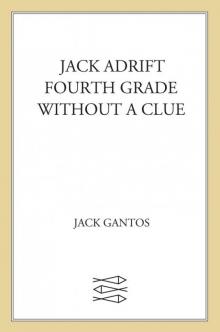 Jack Adrift
Jack Adrift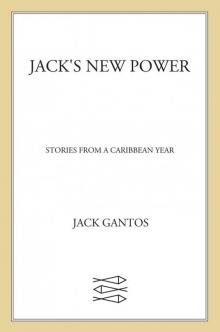 Jack's New Power
Jack's New Power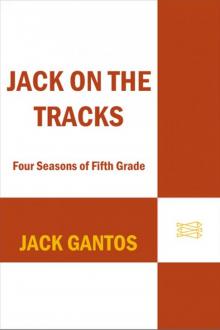 Jack on the Tracks
Jack on the Tracks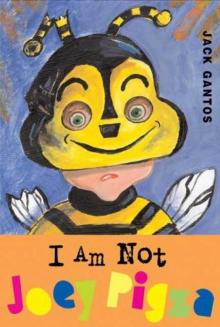 I Am Not Joey Pigza
I Am Not Joey Pigza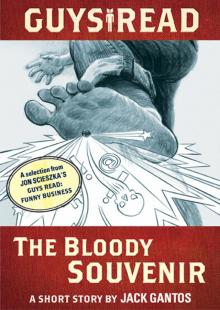 The Bloody Souvenir
The Bloody Souvenir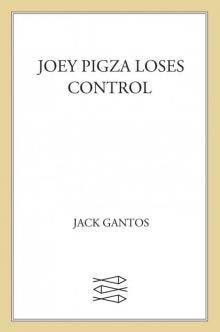 Joey Pigza Loses Control
Joey Pigza Loses Control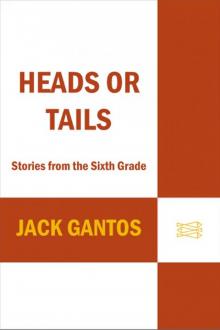 Heads or Tails
Heads or Tails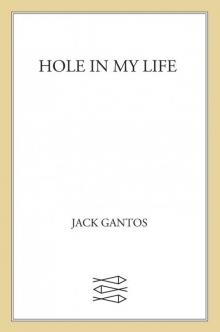 Hole in My Life
Hole in My Life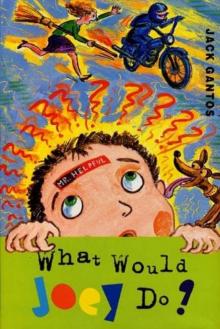 What Would Joey Do?
What Would Joey Do?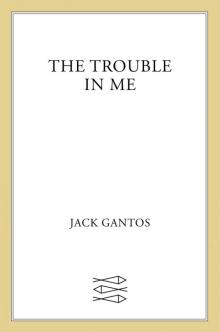 The Trouble in Me
The Trouble in Me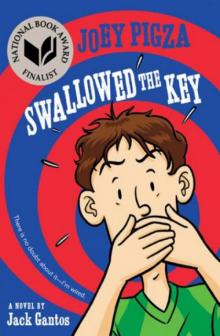 Joey Pigza Swallowed the Key
Joey Pigza Swallowed the Key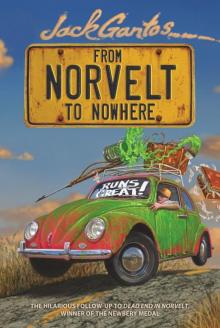 From Norvelt to Nowhere (Norvelt Series)
From Norvelt to Nowhere (Norvelt Series)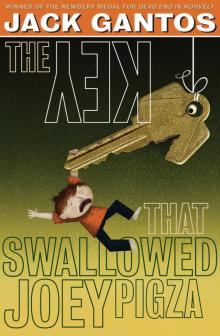 The Key That Swallowed Joey Pigza
The Key That Swallowed Joey Pigza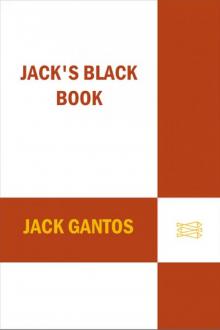 Jack's Black Book
Jack's Black Book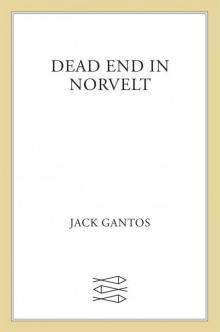 Dead End in Norvelt
Dead End in Norvelt